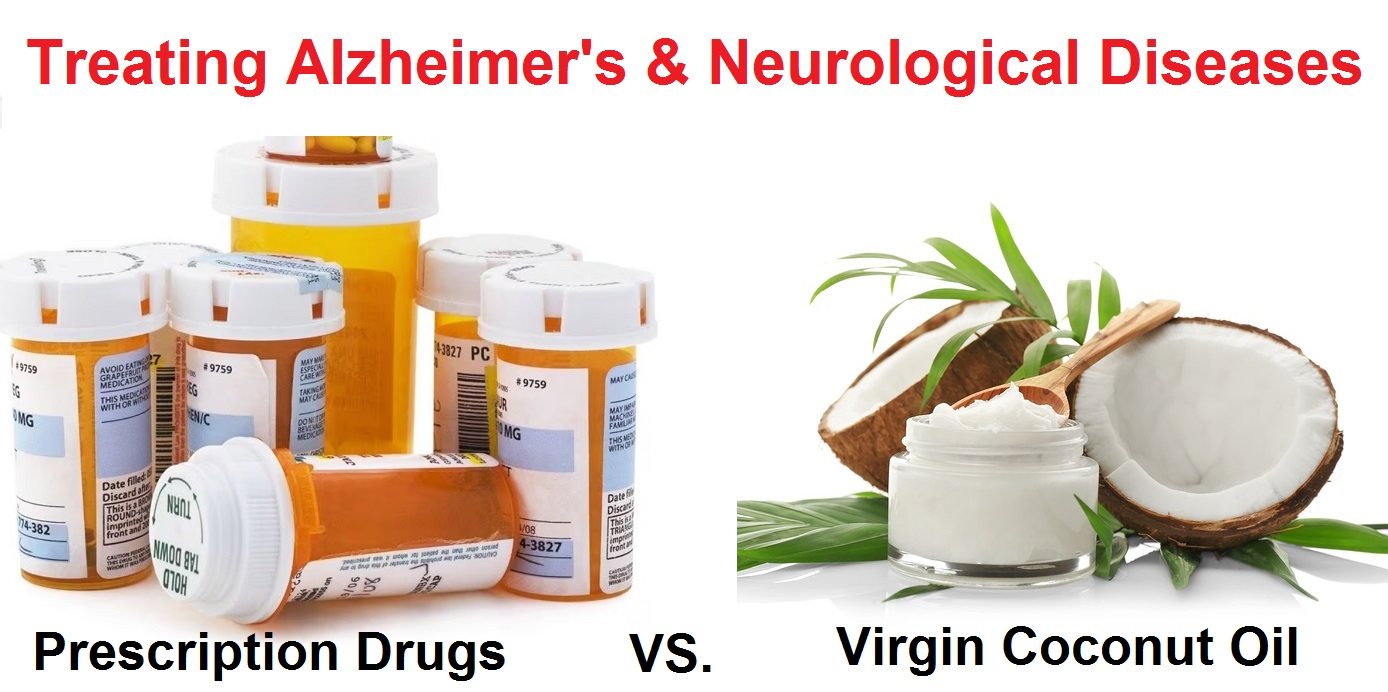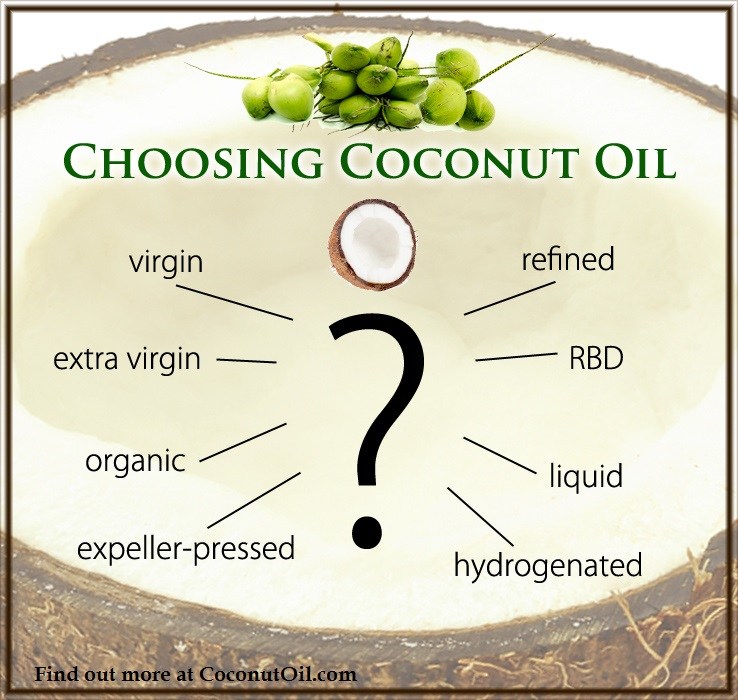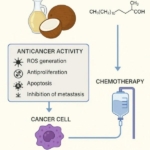
by Brian Shilhavy
Editor, Health Impact News
The near miraculous effects of some Alzheimer’s sufferers recovering their memories and stopping or even reversing the effects of Alzheimer’s disease have been widely published in the alternative health media for at least a decade and a half now, and CoconutOil.com, part of the Health Impact News network, is the world’s leading source on information about using coconut oil for Alzheimer’s patients.
While a few clinical trials have been proposed and even started to try and understand how coconut oil works so well with neurological diseases like Alzheimer’s and Parkinson’s Disease, coconut oil is a food and natural product that cannot be patented. Hence, few are willing to invest the money needed to study this in clinical trials.
However, there is a strong market for by-products from coconut oil to be used in other formulations that can be patented. The main extract from coconut oil that has a long history of marketing is lauric acid, a medium chain fatty acid that has been used in applications like food preservation for years, due to its known use as an anti-microbial.
It is also used sometimes in conjunction with pharmaceutical drugs, antibiotics, where pathogens become resistant to pharmaceutical antibiotics.
Coconut oil is nature’s richest source of lauric acid, with 50% of the composition of coconut oil consisting of lauric acid. Nature’s second most abundant source of lauric acid is human breast milk, at about 8%.
In fact, in a recent study published earlier this year (2025), the product “Monolaurin”, which is derived from lauric acid extracted from coconut oil, was studied on “inhibiting antibiotic-resistant Staphylococcus aureus in patients with atopic dermatitis” skin conditions.
Monolaurin inhibits antibiotic-resistant Staphylococcus aureus in patients with atopic dermatitis
Abstract
Frequent use of antibiotics increases the incidence of antimicrobial-resistant Staphylococcus aureus in atopic dermatitis (AD), which prompts the search for new treatments. Monolaurin is a chemical byproduct found in coconut oil and has anti-bacterial properties.
This study aimed to investigate the inhibitory effect of monolaurin on antimicrobial-resistant S. aureus. Thirty children and thirty adults diagnosed with AD were recruited and swabbed at three different sites: lesion, non-lesion, and nasal mucosa. Methicillin resistance and high-level mupirocin resistance in S. aureus were identified using mecA and mupA PCR, respectively, whilst fusidic acid resistance were detected by fusA gene sequencing.
The broth microdilution method and tetrazolium bromide assays were used for monolaurin susceptibility and cellular cytotoxicity, respectively. We show that S. aureus was frequently isolated from lesions of both children and adults with AD. One isolate of methicillin-resistant S. aureus (MRSA) harboring mecA, one isolate of mupirocin-resistant S. aureus harboring mupA, and four isolates of fusidic acid-resistant S. aureus with novel point mutations of fusA were found in the children group.
In silico molecular docking showed that these mutants interacted weakly with fusidic acid, explaining the mechanism of drug resistance. Monolaurin inhibited these antimicrobial-resistant S. aureus isolates with a minimal inhibitory concentration of 2 µg/mL without cytotoxicity to cultured epidermal and dermal cells. These data show that monolaurin could potentially be used to inhibit antimicrobial-resistant S. aureus in AD patients.
So it was not surprising to me that two studies have already been published this year (2025) looking at using lauric acid from coconut oil to develop treatments for Alzheimer’s Disease, given Big Pharma’s failures over the years to develop a drug that had any real positive effects on the disease.
This could eventually lead to some kind of patented product, as Monolaurin is, to be used in Alzheimer’s treatments.
Effects of lauric acid on cognitive impairment in a scopolamine-induced Alzheimer’s disease-like rat model
Abstract
Background: Alzheimer’s disease (AD) is a multi-factorial type of dementia that poses a social and medical burden in that no effective treatment has been achieved yet. Impaired brain glucose metabolism is one of the major pathophysiological factors linked to its onset and progression. Lauric acid (LA) is a triglyceride with medium chain that can produce ketone body utilize by the brain as an alternative energy source.
Objective: Therefore, the present study was carried out with the purpose of evaluating the effect of LA on cognitive impairments in scopolamine-induced AD-like rat model.
Methods: Forty-two male Wistar rats were divided into six groups to receive normal saline, scopolamine, scopolamine with Donepezil, and scopolamine with varied doses of LA for a period of 21 days. Morris water maze (MWM) and Elevated Plus Maze (EPM) tests were performed to evaluate cognitive performance. After, brains were harvested and processed to assay for the level of malondialdehyde (MDA), reduced glutathione (GSH), catalase (CAT), superoxide dismutase (SOD), acetylcholinesterase (AChE) and interleukin-6 (IL-6). Histological analyses using Haematoxylin and eosin staining was also performed.
Results: The LA-treated groups demonstrated memory retention in the MWM and EPM tests, and showed increased levels of CAT, SOD, and GSH similar to the Donepezil group, in contrast to the scopolamine only group while MDA levels, IL-6, and AChE activity were reduced in the LA treated groups contrasted to scopolamine only group. LA reduces oxidative stress, neuroinflammation, and AChE activity, which indicates a possible ability of LA to protect against AD.
The Therapeutic Potential of Butyrate and Lauric Acid in Modulating Glial and Neuronal Activity in Alzheimer’s Disease
by Nutrients.
Abstract
Alzheimer’s disease (AD) is a progressive neurodegenerative disorder marked by amyloid-β plaque accumulation, tau tangles, and extensive neuroinflammation. Neuroinflammation, driven by glial cells like microglia and astrocytes, plays a critical role in AD progression. Initially, these cells provide protective functions, such as debris clearance and neurotrophic support.
However, as AD progresses, chronic activation of these cells exacerbates inflammation, contributing to synaptic dysfunction, neuronal loss, and cognitive decline. Microglia release pro-inflammatory cytokines and reactive oxygen species (ROS), while astrocytes undergo reactive astrogliosis, further impairing neuronal health. This maladaptive response from glial cells significantly accelerates disease pathology.
Current AD treatments primarily aim at symptomatic relief, with limited success in disease modification.
While amyloid-targeting therapies like Aducanumab and Lecanemab show some promise, their efficacy remains limited. In this context, natural compounds have gained attention for their potential to modulate neuroinflammation and promote neuroprotection.
Among these, butyrate and lauric acid are particularly notable. Butyrate, produced by a healthy gut microbiome, acts as a histone deacetylase (HDAC) inhibitor, reducing pro-inflammatory cytokines and supporting neuronal health.
Lauric acid, on the other hand, enhances mitochondrial function, reduces oxidative stress, and modulates inflammatory pathways, thereby supporting glial and neuronal health. Both compounds have been shown to decrease amyloid-β deposition, reduce neuroinflammation, and promote neuroprotection in AD models.
This review explores the mechanisms through which butyrate and lauric acid modulate glial and neuronal activity, highlighting their potential as therapeutic agents for mitigating neuroinflammation and slowing AD progression.
These studies are both designed to use lauric acid from coconut oil to develop new drugs or supplements for Alzheimer’s that can be patented.
But you don’t have to wait for these new drugs or supplements! Coconut Oil, especially Virgin Coconut Oil, can be readily purchased right now in almost any store that sells groceries that include edible oils.
See all the testimonials we have published over the years here. A list of all the studies on coconut oil for other issues beside Alzheimer’s and neurological problems, can be found on our Peer Reviewed research page here.
Of course I know of a great source to purchase a high quality premium coconut oil, but to link to that source from this article is illegal according to the rules of the FDA, as I would be accused of selling “unapproved drugs” by the FDA and be subject to arrest and possibly go to jail, as I have been threatened in the past by the FDA.
Also know that in spite of the current Secretary of Health and Human Services, Mr. Kennedy, who is promoting animal fats over “seed oils”, the FDA STILL states that saturated fat in general, and coconut oil in particular, is dangerous for your health as a matter of national USDA policy. (Source.)
Comment on this article at HealthImpactNews.com.




 HHS Secretary Kennedy Breaks His Promise: "War on Saturated Fat" Kept in Tact with New U.S. Dietary Guidelines
HHS Secretary Kennedy Breaks His Promise: "War on Saturated Fat" Kept in Tact with New U.S. Dietary Guidelines Research Continues to Show Virgin Coconut Oil's Effectiveness in Treating Cancer
Research Continues to Show Virgin Coconut Oil's Effectiveness in Treating Cancer Coconut Oil Continues to Benefit Alzheimer's Patients over Drugs as Studies Continue for Neurological Benefits
Coconut Oil Continues to Benefit Alzheimer's Patients over Drugs as Studies Continue for Neurological Benefits How the Simple High-Fat Low-Carb Ketogenic Diet Continues to Change People's Lives
How the Simple High-Fat Low-Carb Ketogenic Diet Continues to Change People's Lives New Studies Continue to Show that Coconut Oil is the Best Oil for Treating Skin Conditions and Maintaining Healthy Skin and Teeth
New Studies Continue to Show that Coconut Oil is the Best Oil for Treating Skin Conditions and Maintaining Healthy Skin and Teeth